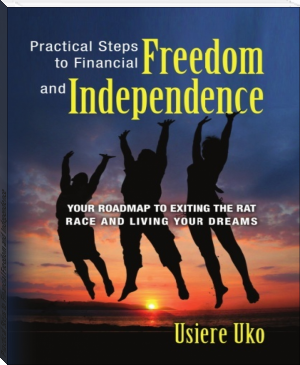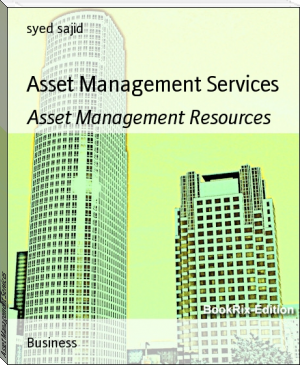Practical Steps to Financial Freedom and Independence - Usiere Uko (books suggested by elon musk txt) 📗

- Author: Usiere Uko
Book online «Practical Steps to Financial Freedom and Independence - Usiere Uko (books suggested by elon musk txt) 📗». Author Usiere Uko
Practical Steps
To
Financial Freedom and Independence:
Your road map to exiting the rat race and living your dreams
By Usiere Uko
1
MAKE UP YOUR MIND
Until one is committed, there is hesitancy, the chance to draw back. Concerning all acts of initiative (and creation), there is one elementary truth that ignorance of which kills countless ideas and splendid plans: that the moment one definitely commits oneself, then Providence moves too.
—William Hutchinson Murray
I will never forget July 2002. I still remember the exact spot on which I stood one Sunday afternoon after a church service at Freedom’s Ark in the northern London borough of Haringey. My mind was troubled. Three days earlier I had received a summons from my employer to head back to Nigeria immediately for a new assignment. My pastor asked me what my plans were. I told him.
“You mean you’re leaving your pregnant wife behind with people you hardly know and returning alone to Lagos?” he asked
I nodded.
“I don’t think you know what you’re doing.” He shook his head in disapproval.
I was still staring at him speechlessly as his car pulled up. He waved as he got into the car with his family. They zoomed off and suddenly I felt cold inside—and angry.
I had come to London eighteen months earlier for a project that was to last for four years. I had settled down and was getting ready to start a family when I’d gotten this mail from my employer out of the blue. Suddenly I was without income in a foreign country. My wife was a few months away from delivering our long-awaited first child. She was under consultant care due to earlier complications with the pregnancy, so I could not take her back with me to Lagos. That was out of the question. Nor could I stay behind with her. I needed my job. I ought to have quit right then, but I could not afford to. I couldn’t imagine life without a salary and was too scared even to entertain such a thought. I was not a free man. I had no choice but to bow to the wishes of my employers.
In my wife’s state, I could not leave her all alone in our flat, and I could no longer afford the rent. So I arranged for her to move in with a couple from church. A range of emotions coursed through my body. I felt naked and alone. I was angry. I was mad. I was powerless. I knew my wife understood, but it did not make me feel better. I felt sorry for myself.
I held back tears as I looked up at the clear London sky. Never again, I vowed, would my employer—or anyone for that matter—dictate to me how to live my life. I would achieve financial freedom whatever it took. I would live on my own terms. I would go for my dreams. If others could do it, so could I.
* * *
Deep down we all truly desire to live life on our own terms—to do what we want how we want and when we want it. To live our dreams. As children we believed anything was possible. We lived in a make-believe world where dreams always came true. When we grew up, we were made to believe life doesn’t work that way. We had to stop dreaming and start earning a living. Building castles in the air will not put food on the table, which you have to do before indulging in the luxury of dreaming about your future. You have to retire before you go for your dreams.
The fact that most of us have given up on our dreams doesn’t mean that dreams don’t come true. The fact that your clock has stopped working doesn’t mean that time has come to a standstill. Dreams come true; it just hasn’t happened to you yet. We watch it happen to others. We see it on TV, where every day people like you and me start ordinarily and achieve extraordinary things. We call them celebrities and queue up to collect their autographs.
If others can do it, why can’t you?
What do they have that you don’t?
What do they know that you don’t?
Good questions. You may have made various attempts that took you nowhere. Your New Year’s resolutions may have ended in a puff of smoke. You may have concluded your parents and other naysayers were right after all. Maybe it was not meant to be. There’s nothing special about you. Your past defines your future and ultimately your destiny. Don’t bother trying. Who do you think you are? Quit dreaming and face reality.
Nothing can be further from the truth. You have all it takes—if you’re willing to pay the price. Anyone who is willing can have whatever he wants. The trigger point is when you make up your mind to go for it whatever it takes.
However, making a decision is not enough. The quality of the decision is the deciding factor. You’ll be tested by trials, storms, and setbacks. If your decision isn’t firm, you’ll turn back and give up. Until you fully commit to the decision, you have not made up your mind.
For most of us, making up our minds is a process. We can make a decision to go for it today, falter tomorrow, turn back the day after, and make another attempt weeks or months later. You have to make up your mind until your mind is fully made up. That’s when you move from interest to total commitment. That is when you cross the point of no return.
MAKE A ONE HUNDRED PERCENT COMMITMENT
Your mind is fully made up when you get to the place of one hundred percent commitment. Talk is over. Internal debates come to an end. No more excuses. You move from should to MUST. You throw your hat into the ring. You’re ready to put your money where your mouth is. If you falter you’ll push on regardless. You’re ready to pay the price. You’ve burned your bridges
Getting to the point of one hundred percent is the most difficult step for most of us. There are differences between desire, interest, and commitment, although they all look alike. With desire and interest, there’s a chance of turning back. With commitment going back is foreclosed. It’s like water: at 211 degrees it’s scalding; at 212 degrees it boils. That’s the tipping point. Anything short of 212 degrees is just not enough.
It’s the same with one hundred percent commitment. Until you get to that point, there’s a chance of drawing back. Whenever difficulties show up, we grab that chance and throw in the towel. We’ve all been there, cruising on New Year’s Resolutions Boulevard. We reel out lofty goals on January 1 and get on our way merrily but begin to run out of steam around Valentine’s Day. We give up and return to our old routine.
The best way to avoid this trap is to make a firm decision to follow through to the finish line. The moment you are one hundred percent committed, there’s no chance to draw back. Your mind is made up and you don’t have to think about the issue again. Case closed. No retreat, no surrender. There’s no room for going back to debate it: Shall I? Shall I not? Maybe. You’ve made up your mind to give it what it takes. You will accept no excuses whatsoever.
This frees up tons of energy that would otherwise be expended on internal debate on the topic over and over again, robbing you of crucial energy to create the momentum to move forward. It frees you to focus fully on the task at hand. This is what separates winners from losers: one hundred percent commitment.
So how do you get to the point where your mind is fully made up?
What makes you to get from the point of desire and interest to the point of commitment?
What takes you to the tipping point?
WHEN ENOUGH IS ENOUGH
Change happens when you get to the point of enough. You’ve suffered enough, endured enough pain, abuse, and shame, received enough, learned enough, understood enough, attained enough awareness, and, if you’re like me, talked about it enough. Enough is the tipping point. A day comes when something snaps inside and you know—this is it. The cup becomes full and runs over. For some it can happen in an instant, but for many it takes time.
When there’s still more room to endure, you continue to tolerate. You’re not there yet. You continue to murmur, complain, and wish. But the moment you’ve had enough, you act decisively. You rise up and just do it. You change habits, laws, government, pursuit of a goal, etc. You walk away from an abusive relationship, a job you hate, a neighborhood you dislike.
Take, for example, Mohamed Al Bouazizi. Tuesday, December 17, 2010 was a day like any other day in Sidi Bouzid, the small town in Tunisia where he lived. Mohamed was a young college graduate turned fruit vendor, and one morning he went out to ply his trade. In a routine confrontation, municipal officers seized his fruits for lack of legal permit and when he protested, he received a beating. He went to the municipal building to demand his property back and received further beating. He then went to the governor’s office and demanded an audience but was refused.
Something snapped. Mohamed had enough. He decided his voice must be heard no matter what. With all doors slammed in his face, he drenched himself in paint thinner and set himself ablaze. That fire ignited a revolution that is currently raging through the Arab world, sweeping away heads of state in its wake. When the history of the Arab Spring is told, Mohammed’s name will be written in gold as the tragic hero who started it all.
Enough is where the trigger is. More often than not, anger plays a crucial role, as in Mohammed’s case. Anger often brings out the boldness you lack in your more sober moments. Anytime I feel really angry, I channel my anger at the root cause of the problem to ensure it does not happen again. Some of my streams of income came to me out of my anger at not having enough money. Rather than dissipating that anger in endless arguments with my spouse, I vented my frustration on my projects. This served me well in moving them off the drawing board into reality.
Many entrepreneurs ventured into the business world out of anger. They hated their jobs, what their bosses did to them, or being fired for no just cause. After endless searches for other jobs, the anger built up to the point where they decided to take the bull by the horns and go for it.
Enough is where full commitment occurs and change happens. This explains why when fifty people attend a seminar, forty-five jump and scream, “Aha!” but one year later only ten people have walked their talk. The remaining thirty-five still have some distance to go before they get to enough or reach their tipping points. They still need an extra push to get there.
You need to keep going until you get to the point of one hundred percent commitment to going for your financial freedom dreams—until you’ve learned enough to attain the comfort level you need to commence your journey. You have to keep pushing yourself until you get to your tipping point. Deep down in the soul of every man and woman is a yearning for greatness and attainment of their utmost potential, but often the price to be paid keeps us stuck in our comfort zones. The pain of not living your dreams is waiting further down road, so you have to pay either way—now or later. It’s better to embrace the pain of discipline for growth than face





Comments (0)